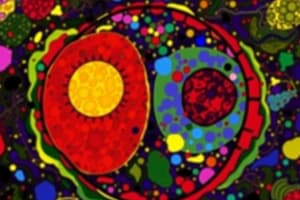Podcast
Questions and Answers
What is the primary function of the cell membrane?
What is the primary function of the cell membrane?
- Cell division
- Energy production
- Regulation of molecule entry and exit (correct)
- Protein synthesis
Which organelle is known as the 'powerhouse' of the cell?
Which organelle is known as the 'powerhouse' of the cell?
- Golgi Apparatus
- Lysosomes
- Mitochondria (correct)
- Ribosomes
What is contained within the nucleus of a cell?
What is contained within the nucleus of a cell?
- Ribosomes
- Chromatin and nucleolus (correct)
- Peroxisomes
- Cytoplasm
What is the main role of lysosomes in a cell?
What is the main role of lysosomes in a cell?
Which organelle processes, packages, and secretes modified cell products?
Which organelle processes, packages, and secretes modified cell products?
What is the primary function of ribosomes within a cell?
What is the primary function of ribosomes within a cell?
Which cytoskeletal structure is involved in maintaining cell shape?
Which cytoskeletal structure is involved in maintaining cell shape?
What role do centrioles play in cellular function?
What role do centrioles play in cellular function?
What is the primary function of the nucleus in a cell?
What is the primary function of the nucleus in a cell?
Which phase of mitosis involves the alignment of chromosomes at the equatorial plate?
Which phase of mitosis involves the alignment of chromosomes at the equatorial plate?
What occurs during telophase of mitosis?
What occurs during telophase of mitosis?
Which structure is described as the cell's outer protective layer?
Which structure is described as the cell's outer protective layer?
What condition is characterized by nondisjunction of chromosomes leading to mental retardation?
What condition is characterized by nondisjunction of chromosomes leading to mental retardation?
What happens to the nuclear envelope during prometaphase?
What happens to the nuclear envelope during prometaphase?
During which phase of mitosis do the nucleolus and nuclear envelope disappear?
During which phase of mitosis do the nucleolus and nuclear envelope disappear?
What is a common feature of cells with malignant tumors?
What is a common feature of cells with malignant tumors?
What is the primary function of filaments in a cell?
What is the primary function of filaments in a cell?
Which stage of the cell cycle involves the copying of DNA?
Which stage of the cell cycle involves the copying of DNA?
During which phase of the cell cycle does the cell begin to prepare for division by condensing genetic material?
During which phase of the cell cycle does the cell begin to prepare for division by condensing genetic material?
What type of inclusions can be found in cells as nutritive substances?
What type of inclusions can be found in cells as nutritive substances?
What does the 'M' phase in the cell cycle stand for?
What does the 'M' phase in the cell cycle stand for?
Which type of inclusions in a cell are involved in the storage of pigment granules?
Which type of inclusions in a cell are involved in the storage of pigment granules?
What role do vacuoles serve in the cell?
What role do vacuoles serve in the cell?
What is the defining characteristic of the G1 phase in the cell cycle?
What is the defining characteristic of the G1 phase in the cell cycle?
Flashcards are hidden until you start studying
Study Notes
Cell Structure
- Basic unit of life, composed of various parts each with specific functions.
Parts of the Cell
-
Cell Membrane (Plasma Membrane)
- Regulates entry and exit of molecules.
-
Nucleus
- Central structure with a double membrane enclosing nuclear pores.
- Contains chromatin (DNA and proteins) with a nucleolus that produces ribosomal subunits.
-
Cytoplasm
- Semifluid substance between cell membrane and nuclear membrane containing organelles.
Organelles and Their Functions
-
Ribosomes
- Site of protein synthesis.
-
Endoplasmic Reticulum (ER)
- Rough ER (RER): Studded with ribosomes, involved in protein processing.
- Smooth ER (SER): Lacks ribosomes, involved in lipid processing and detoxification.
-
Mitochondria
- Known as the "powerhouse," responsible for ATP production via cellular respiration.
-
Lysosomes
- Digestive enzymes for breaking down macromolecules.
-
Golgi Apparatus
- Modifies, packages, and secretes cell products.
-
Peroxisomes
- Involved in oxidative processes.
-
Cytoskeleton
- Composed of microtubules, intermediate filaments, and actin filaments; provides structure and facilitates movement.
-
Centrioles
- Assist in cell division.
-
Cilia
- Motile projections that aid in movement.
-
Filaments
- Provide shape and mechanical strength to cells.
Inclusions (Non-Living Components)
-
Nutritive Substances
- Includes carbohydrates, fats, and proteins.
-
Pigment Granules
- Example: Melanin, involved in coloration.
-
Vacuoles
- Storage cavities within the cell.
-
Foreign Substances
- Engulfed by macrophages.
Cell Cycle
-
Process through which a cell divides to form two new cells, consisting of stages: G1, S, G2, and M.
-
G1 Stage
- Preparatory phase for cell division.
-
S Phase
- DNA synthesis occurs, duplicating genetic material.
-
G2 Stage
- Organizes and condenses genetic material in preparation for division.
-
M Phase
- Mitosis takes place where genetic material is distributed into daughter cells.
Nucleus
- Largest organelle directing protein synthesis.
- Contains nuclear membrane, nucleolus, and chromatin.
Plasma Membrane
- Envelops the cell and maintains structural integrity known as plasmalemma.
Mitosis Stages
- Prophase: Nucleolus and nuclear envelope disappear.
- Prometaphase: Nuclear envelope fully disappears.
- Metaphase: Chromosomes align at the equatorial plate.
- Anaphase: Chromatids move to opposite poles.
- Telophase: Nuclear envelope and nucleoli reform.
Common Diseases
-
Down Syndrome (Trisomy 21)
- Resulting from nondisjunction of chromosomes; characterized by mental retardation and short stature.
-
Malignant Tumors (Cancer)
- Characterized by enlarged, abnormally shaped nuclei with dark staining.
Studying That Suits You
Use AI to generate personalized quizzes and flashcards to suit your learning preferences.




